Journalist and author Beppe Severgnini serves as editor in chief of the weekly magazine for Italy’s Corriere della sera newspaper, has long been a contributing opinion writer for the New York Times, and has written over 17 books. Since 1998, Severgnini has also written a daily column for the Corriere della sera, in which he responds to readers’ queries about contemporary Italian issues. This past fall, our colleague Rita Paolino sent a letter in to the column, which is aptly called “Italians,” asking what faculty might do to highlight the continued relevance of studying Italian language and culture in North America. Not only did Severgnini respond in print, he agreed to have a live conversation with us via Zoom about that question and more.
On Monday, March 8, William & Mary Italian Studies students, faculty and over 100 guests from other institutions gathered together online for a lunchtime conversation with Severgnini. After opening remarks from the author, Prof. Sara Mattavelli deftly moderated a conversation between Severgnini and our students, who had prepared a thoughtful collection of questions in advance. Topics ranged from Italy’s experience with the coronavirus, to regional differences within the country, to students’ futures and how they might apply their experience with Italian Studies. Severgnini and guests were particularly struck by a question from student Santiago Lanza, who cited the author’s Ted Talk on “Five Ways to Fail Perfectly.” All in all, it was a rich and thought provoking conversation, and we were delighted to spend time with Severgnini. Please watch the video below for the full conversation.
















































